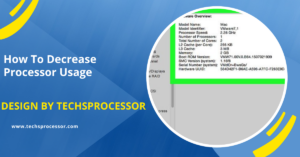Is a 3 2ghz celeron processor good – A Comprehensive Guide!
A 3.2 GHz Celeron processor is good for basic computing tasks, media consumption, and light multitasking. However, it struggles with more demanding tasks like gaming, creative work, and software development.
This article will explore the capabilities of a 3.2 GHz Celeron processor and help you determine if it suits your requirements.
Understanding the Celeron Processor:

The Intel Celeron series is designed for entry-level computing. These processors are typically found in budget laptops, desktops, and even some Chromebooks. Celeron processors are known for their affordability, making them a popular choice for basic computing tasks.
Key Features of a 3.2 GHz Celeron Processor:
- Clock Speed: The 3.2 GHz clock speed indicates that the processor can handle tasks at a moderate pace. While this is not the fastest speed available, it is sufficient for everyday activities like browsing the web, working on documents, and streaming videos.
- Core Count: Celeron processors generally have fewer cores compared to higher-end processors like Intel’s Core i3, i5, or i7. A 3.2 GHz Celeron processor typically features dual cores, which limits its ability to handle multi-threaded applications efficiently.
- Power Efficiency: Celeron processors are designed to be power-efficient, making them ideal for devices where battery life is a priority, such as laptops and tablets.
What Can a 3.2 GHz Celeron Processor Handle?
- Basic Tasks: A 3.2 GHz Celeron processor is well-suited for basic computing tasks. You can easily perform activities such as web browsing, checking emails, word processing, and streaming videos without much trouble.
- Office Applications: Running office applications like Microsoft Word, Excel, and PowerPoint should be smooth. However, more demanding tasks, like large spreadsheet calculations or database management, might slow down the processor.
- Media Consumption: Streaming HD videos on platforms like YouTube or Netflix can be done with relative ease. However, you may notice some lag if you try to stream 4K content or run multiple media applications simultaneously.
- Light Gaming: If you’re into casual gaming, a 3.2 GHz Celeron processor can handle older or less demanding games. However, for modern AAA titles or games with high graphics requirements, this processor will struggle to deliver a smooth experience.
- Multitasking: While you can run multiple applications at once, the dual-core nature of a Celeron processor means it can become sluggish with heavy multitasking or when running resource-intensive software.
When Is a 3.2 GHz Celeron Processor Not Ideal?
- Heavy Gaming: For gamers, especially those looking to play the latest titles, a 3.2 GHz Celeron processor is not recommended. These games require more powerful CPUs with higher core counts and clock speeds to run smoothly.
- Creative Work: Tasks like video editing, graphic design, and 3D rendering require significant processing power. A 3.2 GHz Celeron processor lacks the necessary speed and cores to handle these tasks efficiently.
- Software Development: Developers working with complex software environments, virtual machines, or compiling large projects will find a Celeron processor
underwhelming.
- Future-Proofing: If you’re looking for a system that will remain relevant for years to come, a 3.2 GHz Celeron processor may not be the best investment. As software becomes more demanding, this processor might struggle to keep up.
Also Read: What Are The Last 4 Numbers In A Processor – The Role of the Last 4 Digits!
Alternatives to Consider:
If a 3.2 GHz Celeron processor seems insufficient for your needs, here are some alternatives:
- Intel Core i3: Offers better performance for a slight increase in price, making it suitable for everyday tasks and light multitasking.
- AMD Ryzen 3: Known for good multi-core performance at an affordable price, ideal for budget-conscious users who need more power.
- Intel Core i5 or i7: For more demanding tasks, these processors offer significantly better performance and are future-proof for a longer period.
FAQ’s
1. Is a 3.2 GHz Celeron processor good for gaming?
It can handle light gaming, but it’s not suitable for modern AAA titles or games with high graphics requirements.
2. Can a 3.2 GHz Celeron processor run office applications smoothly?
Yes, it can run applications like Microsoft Word, Excel, and PowerPoint with ease.
3. Is a 3.2 GHz Celeron processor suitable for multitasking?
It can handle basic multitasking, but it may become sluggish with heavy multitasking or resource-intensive software.
4. Can I stream HD videos with a 3.2 GHz Celeron processor?
Yes, streaming HD videos on platforms like YouTube or Netflix is manageable, though 4K streaming may cause some lag.
5. Is a 3.2 GHz Celeron processor good for creative work like video editing?
No, it lacks the processing power needed for tasks like video editing, graphic design, and 3D rendering.
6. Is the 3.2 GHz Celeron processor power-efficient?
Yes, Celeron processors are designed to be power-efficient, making them ideal for laptops and tablets with battery life as a priority.
7. Can I use a 3.2 GHz Celeron processor for software development?
It’s not recommended for complex software development tasks, as it may struggle with virtual machines and large projects.
8. Is a 3.2 GHz Celeron processor future-proof?
No, it may struggle to keep up with future software demands, making it less ideal for long-term use.
9. What are some alternatives to a 3.2 GHz Celeron processor?
Alternatives include the Intel Core i3, AMD Ryzen 3, and Intel Core i5 or i7 for better performance.
10. Is a 3.2 GHz Celeron processor worth buying?
It’s worth buying if you need a cost-effective solution for basic tasks, but not if you require robust performance for demanding activities.
Conclusion
A 3.2 GHz Celeron processor is suitable for basic tasks and light multitasking, making it ideal for budget-conscious users. However, it’s not recommended for gaming or resource-intensive work. For more demanding needs, investing in a more powerful processor is advisable.





Post Comment